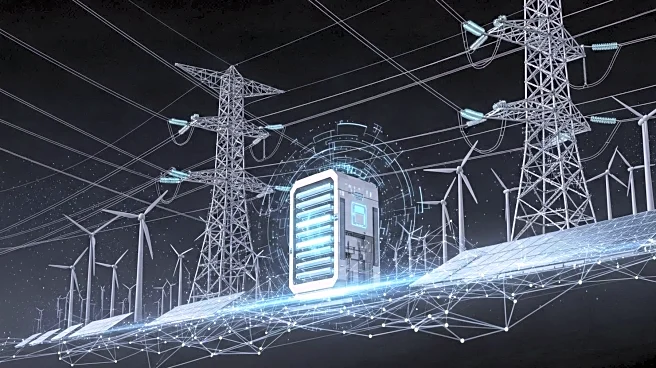What's Happening?
Xcel Energy has filed a proposal with Minnesota regulators to develop a network of distributed battery resources across its grid. This initiative, known as Capacity*Connect, aims to integrate up to 200 MW of battery capacity into system planning by 2028. The program involves deploying batteries at strategic locations, with local businesses and organizations hosting these resources. The proposal seeks approval from the Minnesota Public Utilities Commission, with a budget ranging from $152 million to $430 million, depending on the scale of deployment. The plan is part of Xcel's broader strategy to modernize the energy grid and support economic growth.
Why It's Important?
The proposal represents a significant shift in how utilities incorporate distributed energy resources into system planning and operations. By optimizing the distribution system, Xcel Energy aims to provide capacity and energy benefits without costly bulk system upgrades. This approach could lead to more reliable energy delivery and potentially lower costs for consumers. The initiative also aligns with broader efforts to transition to renewable energy sources, complementing existing plans for additional renewable and dispatchable generating resources. As utilities face increasing demand and infrastructure challenges, innovative solutions like this could play a crucial role in meeting future energy needs.
What's Next?
If approved, Xcel Energy will begin deploying batteries across its grid, with the first phase targeting up to 200 MW by 2028. The program's success could influence other utilities to adopt similar strategies, potentially leading to widespread changes in energy distribution and storage practices. Stakeholders, including local businesses and nonprofit organizations, may benefit from hosting battery resources, providing them with new revenue streams and contributing to community resilience. The initiative could also prompt further regulatory discussions on distributed energy resource integration and its role in modernizing the energy grid.
Beyond the Headlines
The Capacity*Connect program highlights the growing importance of distributed energy resources in achieving energy independence and sustainability. By reducing reliance on centralized power generation, utilities can enhance grid resilience and reduce environmental impact. The program also underscores the need for collaboration between utilities, businesses, and regulators to address the challenges of transitioning to a cleaner energy future. As technology advances, similar initiatives could pave the way for more decentralized and efficient energy systems.











